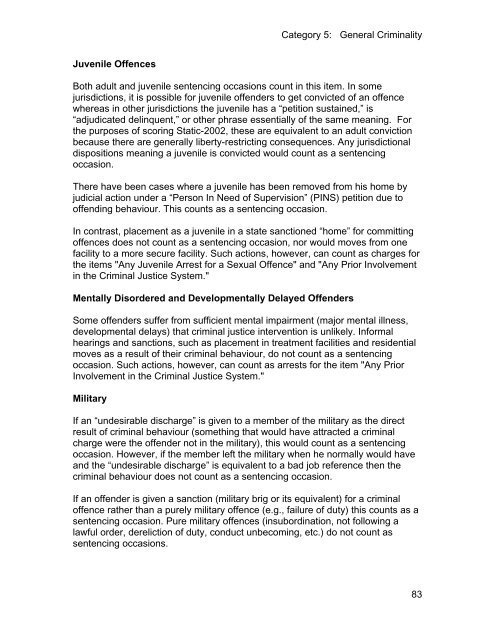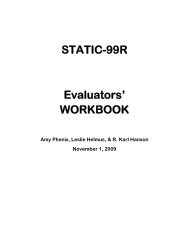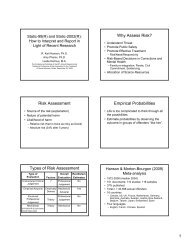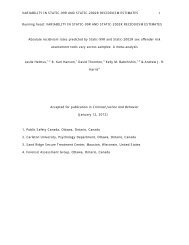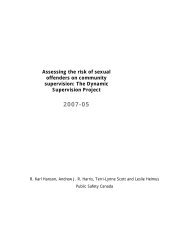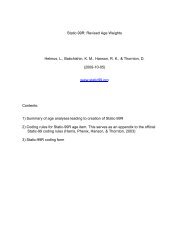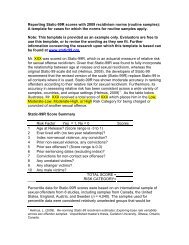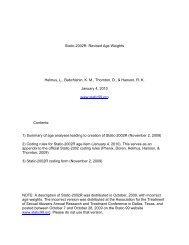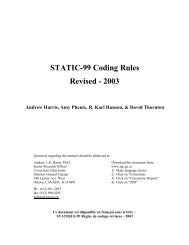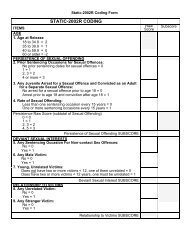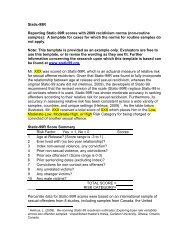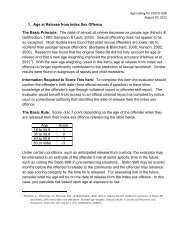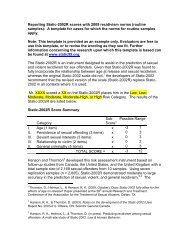Static-2002 coding rules (2009) - Static-99
Static-2002 coding rules (2009) - Static-99
Static-2002 coding rules (2009) - Static-99
Create successful ePaper yourself
Turn your PDF publications into a flip-book with our unique Google optimized e-Paper software.
Category 5: General Criminality<br />
Juvenile Offences<br />
Both adult and juvenile sentencing occasions count in this item. In some<br />
jurisdictions, it is possible for juvenile offenders to get convicted of an offence<br />
whereas in other jurisdictions the juvenile has a “petition sustained,” is<br />
“adjudicated delinquent,” or other phrase essentially of the same meaning. For<br />
the purposes of scoring <strong>Static</strong>-<strong>2002</strong>, these are equivalent to an adult conviction<br />
because there are generally liberty-restricting consequences. Any jurisdictional<br />
dispositions meaning a juvenile is convicted would count as a sentencing<br />
occasion.<br />
There have been cases where a juvenile has been removed from his home by<br />
judicial action under a “Person In Need of Supervision” (PINS) petition due to<br />
offending behaviour. This counts as a sentencing occasion.<br />
In contrast, placement as a juvenile in a state sanctioned “home” for committing<br />
offences does not count as a sentencing occasion, nor would moves from one<br />
facility to a more secure facility. Such actions, however, can count as charges for<br />
the items "Any Juvenile Arrest for a Sexual Offence" and "Any Prior Involvement<br />
in the Criminal Justice System."<br />
Mentally Disordered and Developmentally Delayed Offenders<br />
Some offenders suffer from sufficient mental impairment (major mental illness,<br />
developmental delays) that criminal justice intervention is unlikely. Informal<br />
hearings and sanctions, such as placement in treatment facilities and residential<br />
moves as a result of their criminal behaviour, do not count as a sentencing<br />
occasion. Such actions, however, can count as arrests for the item "Any Prior<br />
Involvement in the Criminal Justice System."<br />
Military<br />
If an “undesirable discharge” is given to a member of the military as the direct<br />
result of criminal behaviour (something that would have attracted a criminal<br />
charge were the offender not in the military), this would count as a sentencing<br />
occasion. However, if the member left the military when he normally would have<br />
and the “undesirable discharge” is equivalent to a bad job reference then the<br />
criminal behaviour does not count as a sentencing occasion.<br />
If an offender is given a sanction (military brig or its equivalent) for a criminal<br />
offence rather than a purely military offence (e.g., failure of duty) this counts as a<br />
sentencing occasion. Pure military offences (insubordination, not following a<br />
lawful order, dereliction of duty, conduct unbecoming, etc.) do not count as<br />
sentencing occasions.<br />
83


